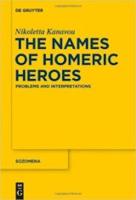
De Gruyter (2015) h/b 187pp £59.99 (ISBN 9873110409970)
This is Vol. 15 in a series called ‘Sôzomena’, based on a DPhil thesis supervised by Stephanie West: an old topic, probably known best to English readers from Stanford’s Odyssey commentary. K.’s general approach is to set modern etymologies alongside what ancients thought these names conveyed, as far as this can be discerned.
Chapter 1 sets out her methodology, in a careful and judicious way. Many names seem to come from the heroic epic tradition, formed in the distant Bronze Age before the Homeric poems were composed (including Linear B attestations), while some were almost certainly chosen by the poet. It is often difficult to distinguish between them.
Some etymologies are straightforward: Agamemnon, ‘Very Steadfast (in battle)’, Hektor ‘He Who Holds (the city)’; others are harder to disentangle, e.g. Achilles and Odysseus (see below). Obvious examples of Homeric inventions are Alcyone in Il. 9, reminding her parents of the melancholy sea bird’s cry; the list of Phaeacian sea captains at Od.8.111ff; the Trojan elder Oukalegon (‘Don’t care’?) in Il.3; and Thersites (from thersos/tharsos, ‘audacity’) in Il.2. Important evidence of how the origins of names were regarded in antiquity occurs for example in Hesiod, Plato, and the Homeric scholia. The ancients were not of course bound by the rules of modern onomastics, and enjoyed what we would call wild etymologizing (‘lucus a non lucendo’); but their solutions often help us to understand how Homer was read in antiquity.
The book’s meat comes in Chapters 2 and 3, which deal specifically with Iliadic and Odyssean names, heroes and minor characters alike. K. picks her way deftly through the varied interpretations of Achilles’ name, drilling down into the well known achos– theory: Achilles brought grief to the Trojans (Callimachus’ view), to himself, and to the Achaeans. She concludes that he is probably pre-Greek, and a later insertion in the Trojan saga—though this does not prevent Homer from playing on the ach– element in his name. Is there some connexion with Acheron, river of Hades? Probably not.
Ajax/Aias is another tough nut, possibly also belonging to an earlier generation of heroes. Sophocles (Ajax 430ff.) thought his name recalled the lamenting cry ‘aiai!’. Nestor could be ‘He Who Returns (safely) Home’, nostos. K. admits there may be something in this, but observes that this is not Nestor’s main function inside the Iliad, and wonders if instead his wisdom is connected with noos, ‘intelligence’. Greek writers enjoyed playing with Helen’s name, whose first syllable sounds as if it is connected with the verb meaning ‘to snare, capture, destroy’, but again K. comes to no firm conclusion.
Names in the Odyssey have always seemed more transparent than in the Iliad, and hence have attracted more scholarly attention. Naming crops up in Odysseus’ often lying narratives: he invents elaborate stories about himself as a Cretan, and most famously brags about tricking the Cyclops (Od.9) into believing that his name is Outis, (‘No one’). K. has a very good long section on Odysseus, pointing out that he not only causes grief and hatred in others (the od– root), but suffers grief and pain himself in his return (as he is never tired of observing). In that sense, his maternal grandfather Autloykos’ outwardly disparaging legacy is perhaps a true nomen omen. Penelope means ‘duck’ (though not with that meaning in the Odyssey), and it seems that ducks are significantly faithful and monogamous. Calypso is of course ‘The Concealer’; but what can we make of the fact that Polyphemus seems to mean ‘Much-famed’? The poem is more self-referential than the Iliad, so that we get public bards called Demodokos (‘Respected by the People’) and Phemius Terpiades (‘Singer, son of Pleasure-giver’).
These few examples illustrate the usefulness of this short book to anyone studying Homer seriously. It can be read straight through, or used as a reference tool. It tells us in mostly jargon-free language what we want to know about names, while also marking out linguistic and anthropological paths for the scholarly to explore. K.’s non-credulous conclusion is that it is not just the ancient or modern etymology of names that is important, but the use the poet makes of them, often in a shifting and punning way, according to context.
Anthony Verity
